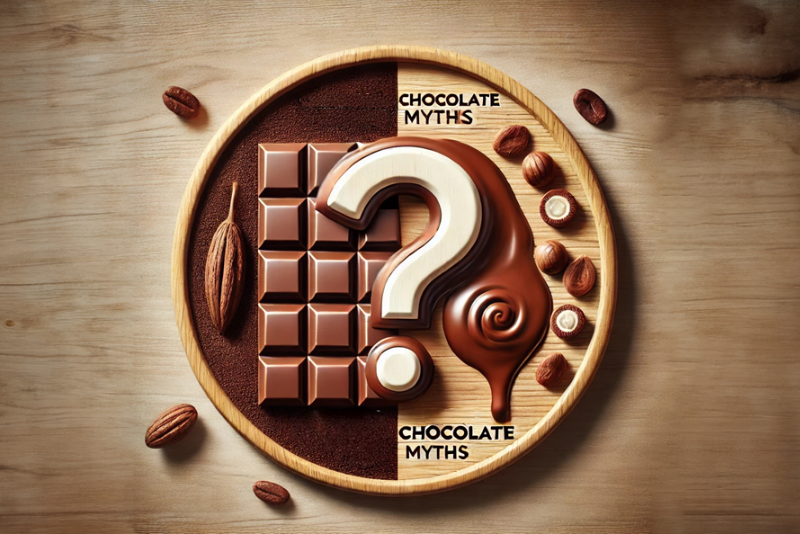Chocolate has been loved for many years. It is a comforting treat and an important ingredient in fancy recipes. Chocolate is special to many people around the world. However, it’s also surrounded by many misconceptions that make people question its health, environmental, and nutritional aspects. Today, let’s uncover the truth behind the most common myths about chocolate and set the record straight.
Chocolate Myths You Should Know
Myth 1: Is Chocolate Unhealthy?
One of the most common chocolate myths is that it’s entirely unhealthy. This belief oversimplifies a complex topic.
Fact: The health impact of chocolate depends on the type and how much you consume. Dark chocolate, in particular, is packed with antioxidants and minerals like magnesium and iron.
Explanation: While milk and white chocolate contain higher sugar and fat content, moderate consumption of dark chocolate can support heart health and even improve mood.
So, next time you wonder, “is chocolate unhealthy?”, remember it depends on your choices and portion size.
Myth 2: Chocolate Is Fattening
It’s easy to think that chocolate always leads to weight gain, but the truth is more nuanced.
Fact: Chocolate, when consumed in small portions, doesn’t automatically lead to weight gain.
Explanation: Portion control and the type of chocolate matter. Dark chocolate, for instance, is more filling and can reduce cravings for less healthy snacks.
While it’s true that overindulging in chocolate may contribute to weight gain, claiming “chocolate is fattening” ignores the role of overall dietary habits.
Myth 3: Chocolate Causes Acne
The chocolate and acne myth has been around for ages, but does it hold up?
Fact: Research shows no direct link between chocolate and acne.
Explanation: Skin health is more influenced by genetics, hormones, and overall diet. Poor eating habits, such as high consumption of sugary and processed foods, may contribute to acne, but chocolate alone isn’t to blame.
So, feel free to enjoy chocolate in moderation without worrying about your skin breaking out.
Myth 4: Chocolate Contains Too Much Caffeine
Many people believe in the chocolate has caffeine myth, thinking it’s as energizing as a cup of coffee.
Fact: While chocolate does contain caffeine, the amount is minimal compared to coffee or tea.
Explanation: A standard serving of dark chocolate has about 20 milligrams of caffeine, far less than the 95 milligrams in an average cup of coffee.
The chocolate caffeine myth exaggerates its impact; chocolate’s caffeine content is unlikely to keep you up all night.
Myth 5: Chocolate Is Bad for the Environment
Concerns about the chocolate environmental impact have grown in recent years.
Fact: While chocolate production can have environmental consequences, many companies are adopting sustainable practices.
Explanation: Ethical initiatives, such as fair trade certifications and eco-friendly farming methods, are reducing the environmental footprint of chocolate production.
By choosing brands that prioritize sustainability, you can enjoy chocolate guilt-free while supporting the planet.
Myth 6: White Chocolate Isn’t Real Chocolate
A frequent debate among chocolate enthusiasts is whether white chocolate is truly chocolate.
Fact: White chocolate is made from cocoa butter, a key component of the cacao bean.
Explanation: Although it doesn’t contain cocoa solids like dark or milk chocolate, its use of cocoa butter qualifies it as part of the chocolate family.
Don’t dismiss white chocolate—it’s a unique variation with its charm.
Myth 7: Chocolate Causes Tooth Decay
The idea that chocolate is harmful to teeth is another persistent myth about chocolate.
Fact: Chocolate doesn’t directly cause cavities. The real culprit is sugar and poor dental hygiene.
Explanation: Dark chocolate, in particular, contains compounds that may even have antibacterial properties, helping reduce harmful oral bacteria.
As long as you brush and floss regularly, you can enjoy chocolate without fearing tooth decay.
Myth 8: Chocolate Is Addictive
Is chocolate really addictive, or do we just crave it because it’s delicious?
Fact: Chocolate cravings are often linked to its sugar and fat content, not addiction.
Explanation: Scientific studies reveal that while chocolate can trigger feel-good chemicals like serotonin, it doesn’t create physical dependence like drugs or alcohol.
Understanding this distinction can help you enjoy chocolate mindfully.
Myth 9: Chocolate Has No Nutritional Value
A common claim is that chocolate is just empty calories, but is it true?
Fact: Dark chocolate, in particular, is rich in antioxidants, flavonoids, and minerals like magnesium and potassium.
Explanation: These nutrients can support heart health, improve brain function, and even boost mood.
Far from being nutritionally void, quality chocolate offers surprising health benefits when consumed in moderation.
Myth 10: Chocolate Is Only a Dessert
Many see chocolate as solely a sweet treat, but this stereotype overlooks its versatility.
Fact: Chocolate can shine in savory dishes too!
Explanation: Mole sauce, a Mexican dish, incorporates chocolate for depth of flavor, and chefs worldwide use chocolate in creative recipes, from cocktails to marinades.
Don’t limit your perception—chocolate can be much more than dessert.
Conclusion
By now, it’s clear that many myths about chocolate are rooted in misconceptions rather than facts. Whether it’s the chocolate and acne myth, the belief that chocolate is fattening, or concerns about chocolate's environmental impact, understanding the truth allows us to enjoy chocolate responsibly and confidently.
Moderation and quality are key to making chocolate a delightful part of a balanced lifestyle. What’s your favorite chocolate myths or fact? Share your thoughts in the comments below, and don’t forget to explore our blog for more insights into the fascinating world of chocolate!


